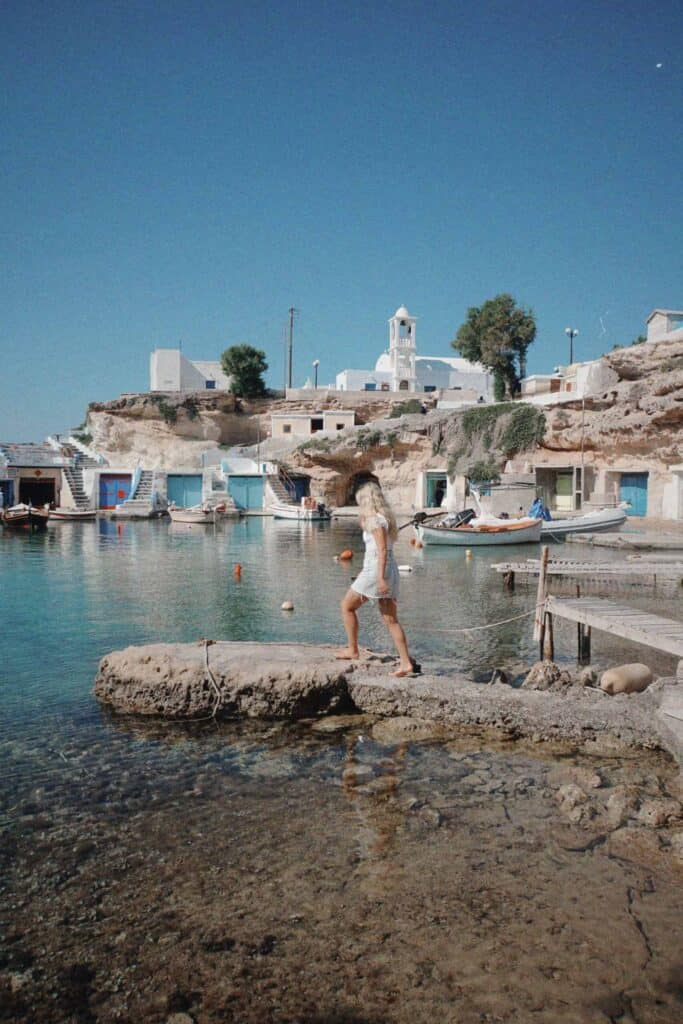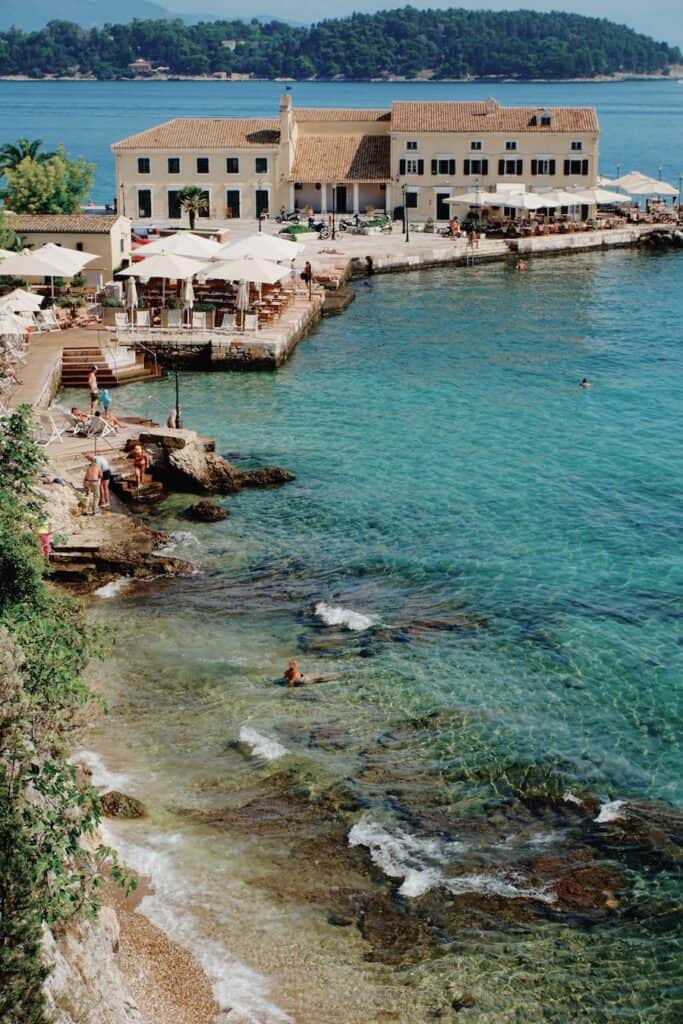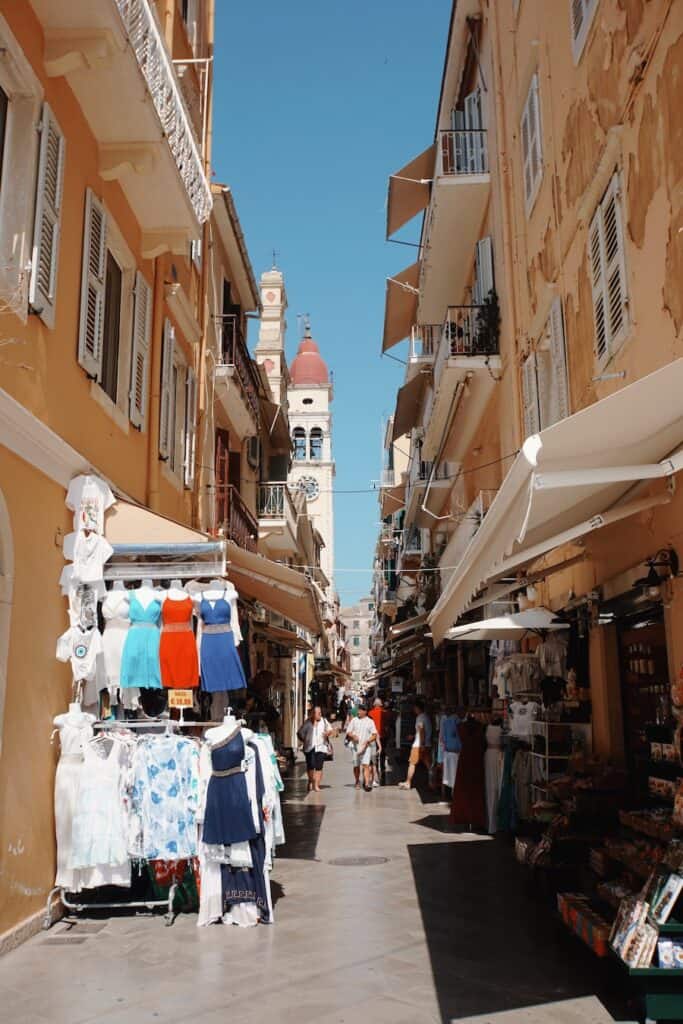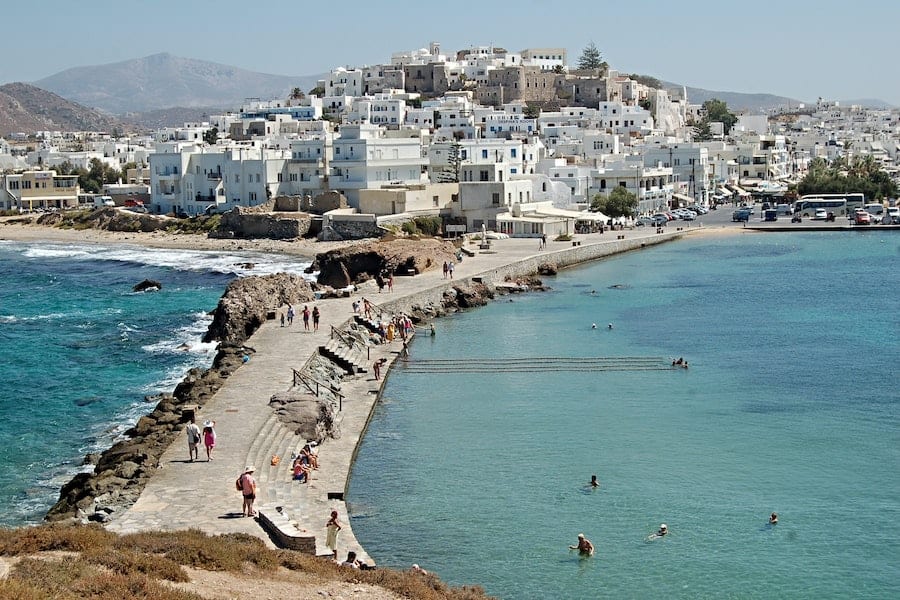Do They Speak English in Greece? Best Greece Language Guide [2024]
Are you one of the many people wondering: do they speak English in Greece? You are not alone!
Greece is home to some pretty beautiful places. From beautiful beaches to iconic islands to historic landmarks, Greece truly has it all. It is one of the most popular places to visit in Europe and for good reason.
I love Greece! It is one of my top 3 favorite countries in the world that I have visited over 5 times in the last 5 years. It is one of my favourite places for a girl’s trip, couples trip, and everything in between.
Keep reading to answer your burning question: do they speak English in Greece?
(Disclaimer: Some links in this post may be affiliate links, meaning if you click on the link and make a purchase, I receive a small commission. This is at no extra cost; you may even receive a small discount. See disclosure for more information.)


In This Post
Do They Speak English In Greece?
Yes! They do speak English in Greece, particularly in tourist areas, major cities, and among the younger population. As a country with a significant tourism industry, many Greeks in hospitality, retail, and other service sectors speak English to accommodate international visitors.
➡️ Read More: Greece vs. Italy: Which is Better?
In Athens, Thessaloniki, and other large cities, as well as on popular islands like Santorini, Mykonos, and Crete, you’ll find a high level of English proficiency. Signs, menus, and information in tourist spots are often available in English, making navigation and communication relatively easy for English-speaking travelers.
However, in rural areas and less touristy islands, the prevalence of English speakers may decrease. Older generations in Greece tend to speak less English, though you’ll often find that people are accommodating and make an effort to communicate.
Read More: Things to do in Milos, Greece


What are the top 3 languages spoken in Greece?
The top three languages spoken in Greece are:
🏛️ Greek: The official and most widely spoken language in Greece. It’s used in government, media, and by the vast majority of the population in daily life.
🏛️ English: Widely spoken, especially among the younger population and in areas with significant tourism. English is commonly used in the hospitality industry, and many Greeks learn it as a second language in school.
🏛️ Turkish: Spoken by a minority, especially in the northeastern regions of Greece near the border with Turkey.
Other minority languages, like Albanian and Bulgarian, are also spoken in certain regions, but on a smaller scale compared to Greek, English, and Turkish.


Can I survive with English in Greece?
Yes, you can 100% survive with English in Greece, especially in tourist-centric areas, major cities, and popular island destinations. I don’t speak Greek and have visited 5 times with zero problems.
You should not have significant issues in Greece if you only speak English, especially in the more touristic areas. I actually find Greek locals speak AMAZING English, some of the best in Southern Europe. Plus they are always trying to make an effort.
Read More: Things to do in Chania, Greece


Is it rude to speak English in Greece?
No, it is not considered rude to speak English in Greece, especially in areas frequented by tourists. Greeks are quite hospitable and accustomed to interacting with people from all over the world.
Given the country’s thriving tourism industry, many Greeks, particularly in urban areas and popular tourist destinations, have a good understanding of English and are often happy to use it to assist visitors.
However, as with visiting any foreign country, it’s appreciated when travelers make an effort to learn a few basic phrases in the local language. Simple Greek greetings or expressions of thanks can go a long way in showing respect for the culture and can enhance your interactions with locals.


Easy Words And Phrases To Use In Greece
Here are some basic Greek words and phrases with phonetic pronunciation to help you communicate during your visit to Greece:
- Hello:
- Formal: “Yia sas” (Γειά σας) – pronounced “YAH-sahss”
- Informal: “Yia sou” (Γειά σου) – pronounced “YAH-soo”
- Goodbye:
- Formal: “Antio sas” (Αντίο σας) – pronounced “ahn-TEE-oh sas”
- Informal: “Antio” (Αντίο) – pronounced “ahn-TEE-oh”
- Please:
- “Parakalo” (Παρακαλώ) – pronounced “pah-rah-KAH-loh”
- Thank you:
- “Efharisto” (Ευχαριστώ) – pronounced “eff-kha-ree-STOH”
- Yes:
- “Nai” (Ναι) – pronounced “neh”
- No:
- “Ohi” (Όχι) – pronounced “OH-hee”
- Excuse me / Sorry:
- “Signomi” (Συγγνώμη) – pronounced “see-GHNO-mee”
- How much?:
- “Poso kanei?” (Πόσο κάνει;) – pronounced “POH-soh KAH-nee”
- Where is…?:
- “Pou einai…?” (Πού είναι…?) – pronounced “poo EE-nay”
- Bathroom:
- “Toaleta” (Τουαλέτα) – pronounced “twa-LEH-tah”
- Water:
- “Nero” (Νερό) – pronounced “NEH-roh”
- Coffee:
- “Kafes” (Καφές) – pronounced “kah-FESS”
- Beer:
- “Bira” (Μπύρα) – pronounced “BEE-rah”
- Food:
- “Fagito” (Φαγητό) – pronounced “fah-YEE-toh”
- I don’t understand:
- “Den katalaveno” (Δεν καταλαβαίνω) – pronounced “den kah-tah-lah-VEH-no”
- Do you speak English?:
- “Milate Anglika?” (Μιλάτε Αγγλικά;) – pronounced “mee-LAH-teh ahng-LEE-kah”
Greek pronunciation can be tricky but don’t worry too much about getting it perfect. Your efforts to speak the language will be appreciated!
Read More: Best Things to do in Corfu
FAQs


Is Greece a friendly country?
Yes, Greece is one of the most friendly countries I have visited in Europe. The Greeks have a long-standing reputation for their warm and welcoming nature, which is deeply rooted in their culture and traditions.
Hospitality, or “philoxenia,” is a highly valued aspect of Greek life, and visitors often find themselves treated with kindness and generosity.
You will likely find that locals are willing to help with directions, recommend places to visit or eat, and sometimes even share stories or engage in friendly conversation. In smaller towns and villages, this hospitality can be even more pronounced, with locals often going out of their way to make visitors feel welcome.
Of course, as with any destination, experiences can vary, and it’s always good to be respectful of local customs and traditions.
Do you tip in Greece?
Yes, tipping is customary in Greece, although it may not be as obligatory or as substantial as in some other countries. Here’s a general guide to tipping in various situations:
➡️ Restaurants: In casual dining restaurants, it’s common to leave a small tip by rounding up the bill or leaving an extra 5-10%. In more upscale restaurants, a tip of 10-15% is appreciated if a service charge isn’t already included in the bill.
➡️ Taxis: For taxis, rounding up to the nearest euro is typical. For a longer journey, you might round up to the nearest 5 euros or add about 5-10% of the fare.
➡️ Hotels: For hotel staff like bellhops or housekeeping, a small tip of 1-2 euros per bag or per day of cleaning is a kind gesture.
➡️ Bars and Cafes: In bars and cafes, leaving some small change (e.g., rounding up to the nearest euro) is sufficient.
➡️ Tour Guides: For tour guides, especially on private tours, a tip of 10-20 euros (depending on the length and quality of the tour) is customary.
➡️ Read More: Best Places to Visit in Europe in November
What are 3 things Greece is known for?
Greece is known for a multitude of things, but three of its most renowned aspects are:
🏛️ Ancient History and Archaeology: Greece is celebrated as the cradle of Western civilization and democracy, with a rich history that dates back thousands of years. It’s home to some of the world’s most famous archaeological sites, including the Acropolis in Athens, the ruins of Delphi, and the former city-states of Olympia and Sparta.
🌊 Greek Islands and Beaches: The Greek islands are famed for their stunning beauty, crystal-clear waters, and unique charm. Destinations like Santorini, Mykonos, Crete, and Rhodes attract visitors from all over the world.
🥙 Cuisine: Greek cuisine is another highlight, known for its flavorful, fresh, and diverse dishes. It’s a quintessential part of the Mediterranean diet, which is praised for its health benefits.


What city in Greece speaks the most English?
Athens is one of the cities where English is commonly spoken, especially in tourist areas, hotels, and restaurants. English is generally understood in popular tourist destinations across Greece, but most English can be found in Athens.
Do people in Santorini speak English?
Yes, English is widely spoken in Santorini, Greece. Santorini is a popular tourist destination, and the locals in the hospitality and tourism industry, such as hotel staff, restaurant employees, and tour guides, often have a good command of English.
Visitors should generally have no trouble communicating in English while exploring the island, particularly in areas frequented by tourists.
Conclusion: Do They Speak English In Paris?
While Greek is the official language, English is widely spoken in Greece, especially in tourist areas, major cities, and by the younger population.
Many Greeks working in the tourism and service industries are proficient in English, and signs and menus in tourist spots often feature English translations.
While rural areas may have fewer English speakers, overall, visitors to Greece will generally find that communicating in English is quite feasible, making it a traveler-friendly destination. However, learning a few basic Greek phrases is always appreciated and can enhance your experience.
Like this post? Pin “Do they Speak English in Greece?” for later!


Love,
SSW
